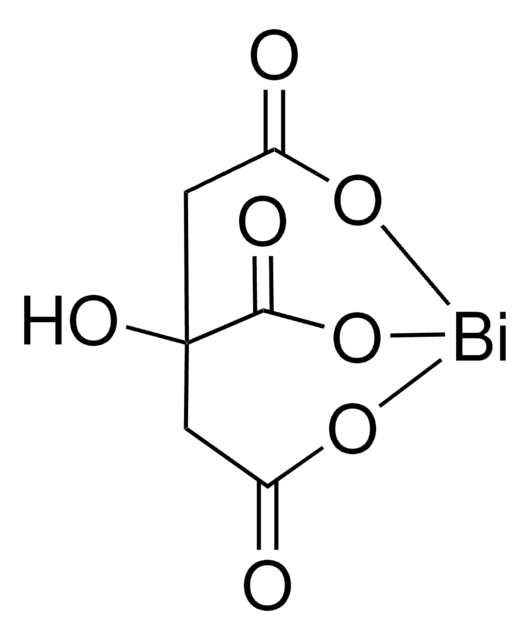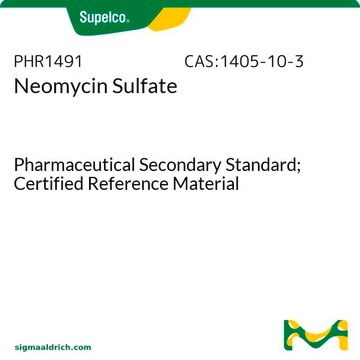480789
Bismuth(III) subsalicylate
99.9% trace metals basis
Sinonimo/i:
Bismuth oxysalicylate, Bismuth subsalicylate, Bismuth(III) salicylate basic
Scegli un formato
Scegli un formato
About This Item
Prodotti consigliati
Livello qualitativo
Saggio
99.9% trace metals basis
Impiego in reazioni chimiche
core: bismuth
reagent type: catalyst
Punto di fusione
>350 °C (lit.)
Stringa SMILE
O[Bi]1OC(=O)c2ccccc2O1
InChI
1S/C7H6O3.Bi.H2O/c8-6-4-2-1-3-5(6)7(9)10;;/h1-4,8H,(H,9,10);;1H2/q;+3;/p-3
ZREIPSZUJIFJNP-UHFFFAOYSA-K
Categorie correlate
Descrizione generale
Applicazioni
- Use of ferric chloride to identify salicylate-containing poisons.: This study explores the use of ferric chloride to detect salicylate compounds, including Bismuth subsalicylate, highlighting its significance in toxicological screenings and emergency treatments. (Hoffman RJ et al., 2002).
- Effect of pepper and bismuth subsalicylate on gastric pain and surface hydrophobicity in the rat.: Investigates the effects of Bismuth subsalicylate on gastric pain and stomach lining properties, providing insights into its gastroprotective mechanisms. (Lichtenberger LM et al., 1998).
- The coccoid forms of Helicobacter pylori. Criteria for their viability.: Examines the effectiveness of Bismuth subsalicylate in targeting different morphological forms of Helicobacter pylori, contributing to its role in eradication therapies. (Bode G et al., 1993).
- Bismuth therapy in gastrointestinal diseases.: A comprehensive review of the therapeutic applications of Bismuth subsalicylate in treating various gastrointestinal disorders, underscoring its pharmacological benefits and safety profile. (Gorbach SL, 1990).
Codice della classe di stoccaggio
11 - Combustible Solids
Classe di pericolosità dell'acqua (WGK)
WGK 3
Punto d’infiammabilità (°F)
Not applicable
Punto d’infiammabilità (°C)
Not applicable
Dispositivi di protezione individuale
Eyeshields, Gloves, type N95 (US)
Scegli una delle versioni più recenti:
Possiedi già questo prodotto?
I documenti relativi ai prodotti acquistati recentemente sono disponibili nell’Archivio dei documenti.
I clienti hanno visto anche
Active Filters
Il team dei nostri ricercatori vanta grande esperienza in tutte le aree della ricerca quali Life Science, scienza dei materiali, sintesi chimica, cromatografia, discipline analitiche, ecc..
Contatta l'Assistenza Tecnica.









